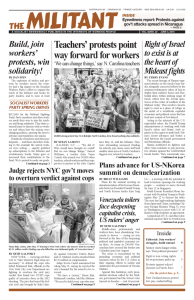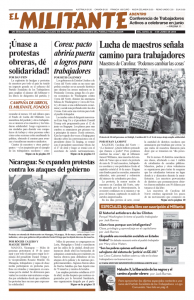Workers who’ve been released from prison after serving time on felony charges are leading fights in Florida and other states over regaining the right to vote. Since the capitalist rulers’ criminal “justice” system is racist, Blacks are disproportionately impacted by the undemocratic restrictions on voting rights for workers released from prison.
Laws vary state by state. The governments in only two states, Maine and Vermont, allow people who are in prison on felony charges to vote while serving their sentences. In 14 states and the District of Columbia, state officials have ruled your right to vote is restored when you walk out of the prison. In 21 states, those jailed on felony raps only get back their voting rights after they are released from parole or probation. And in the remaining 13 states, you lose your voting rights forever, unless the governor or state legislature grants you a pardon.
These anti-working-class restrictions are being challenged in Florida, New York, New Jersey and Mississippi. “We have no say,” New Jersey construction worker Dameon Stackhouse, who is on parole and has been unable to vote since his release after a decade in prison, told the Wall Street Journal May 10.
Nationwide, some 6.1 million people who have been behind bars are disenfranchised, a more than fourfold increase since 1976. The vast majority — over 97 percent — were pressured to plea bargain, with few actually convicted on felony charges.
A disproportionate number are African-Americans. In New Jersey 60 percent of state prisoners are Black, while African-Americans only make up 13 percent of the state’s population, reports the Sentencing Project.
A bill backed by members of the Black Caucus in the New Jersey legislature that would restore voting rights to prisoners and to people who are on parole or probation has made little progress.
In Florida, over 1 million people have signed petitions to place an amendment to the state constitution on the November ballot reinstating voting rights to those who have gone to prison on felony charges. Some 1.5 million people — more than 10 percent of the state’s population — are barred from voting. For African-Americans the figure is 23 percent.
In February, federal Judge Mark Walker ruled Florida’s lifetime ban on voting for those sent to prison on felony charges — part of the Florida constitution for 150 years — violates the U.S. Constitution’s protections against government interference with free association and speech, due process and equal protection under the law.
But at the end of April an appeals court granted Florida Gov. Rick Scott’s appeal for a temporary injunction on the ruling.
In response, hundreds of people marched on the Capitol in Tallahassee April 26, demanding that ex-prisoners’ voting rights be restored and urging people to vote for the amendment changing the state constitution.
The Southern Poverty Law Center and the Mississippi Center for Justice have filed lawsuits charging that Mississippi’s ban on voting rights for felony prisoners released from jail is unconstitutional, arbitrary and discriminatory. Nearly 10 percent of the state’s adult population and 16 percent of African-Americans can’t vote because of this ban.
Anyone who loses their right to vote in Mississippi can only get it reinstated through a gubernatorial pardon or a special bill passed by the legislature. This rarely happens. Only 335 of 166,494 persons who completed their sentences between 2000 and 2015 had their rights restored, according to the Sentencing Project.
In New York people who did time on felony charges and are now out on probation can vote, but not those who are on parole. Gov. Andrew Cuomo, hoping to boost his chances for winning re-election in November, signed an executive order April 18 that would grant conditional pardons to up to 35,000 of those on parole, allowing them to vote.
New York State Senate Republican leader John Flanagan protested the change, complaining that Cuomo using an executive order, rather than going to the state house for a vote, is a “radical departure from the way legislation should be enacted.”
“No one should be denied the right to vote because they are in jail or on probation,” said John Studer, chairman of the Socialist Workers Party campaign committee. “From beginning to end, the capitalist rulers’ cops, courts, prisons and parole system exist to harass and intimidate working people. I join those fighting to win back the right to vote for all workers who have been thrown behind bars.”

